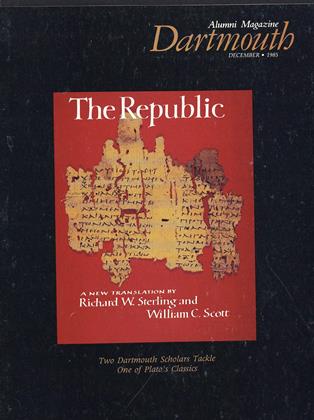Between 1890 and 1920, the American way of life changed drastically. The advent of widespread advertising was both an effect and a cause of some of those changes, according to Harvard historian Susan Strasser, who recently came to campus as the inaugural Robert Allabough '34 Memorial Lecturer. A social historian and author of NeverDone: A History of AmericanHousework, Strasser met with history honors students and gave a public talk entitled "Old Dutch Cleanser and the In-Er-Seal Squadron: The Making of Modern Consumption 1890-1920."
Social history focuses on ordinary people their daily lives or their roles in larger historical events and in her lecture Strasser explored the changes in household consumption that occurred around the turn of the century. That period, she explained, ushered in the era of mass production. Commercially-canned foods and ready-made clothes came into being, and the concept of brands was introduced, to promote recognition and preference for products on the basis of a brand name.
The nascent manufacturing industry responded and the concept of marketing was born. Advertisements changed from small, densely-printed announcements to large displays with slogans and pictures, and the emphasis of ads changed from informing to influencing the buyer. Also, instead of making products to meet existing needs, manufacturers started to create products and then convince the public to buy them.
Hence the birth of the "InEr-Seal Squadron," one of the examples Strasser gave. The makers of Uneeda crackers came up with the In-Er-Seal package a paper wrapper inside the box - to keep their crackers crisp. But the cracker-buying public failed to appreciate the need to reseal the packages after opening them, so Uneeda dispatched squadrons around the country to demonstrate cracker packages.
Strasser also noted several peripheral effects of this period, including a rise in the power of larger manufacturers, and the decline in a personal approach to retailing, as stores, too, became larger.
Besides being of historical interest, Strasser concluded that this information is relevant today because of increasing debate about environmental pollution, concern over United States dependence on other parts of the world, and the drain our demands place on foreign resources. She feels that understanding the development of the consumption patterns that led to these problems may help us address them.
The fund that brought Strasser to campus was endowed by a founder of the Dartmouth Club of Northern New Jersey; Allabough had come to love history at Dartmouth, and upon his death in 1983 he left funds for a continuing series of lectures.
 View Full Issue
View Full Issue
More From This Issue
-
 Feature
FeatureOn the Air
December 1985 By Michael Berg '82 -
 Feature
FeatureThe Impact of Section 504
December 1985 By Nancy Wasserman '77 -
 Cover Story
Cover StoryTranslating Plato's Republic
December 1985 By Kathie Min -
 Cover Story
Cover StoryA Century of Translation
December 1985 By WILLIAM C. SCOTT -
 Cover Story
Cover StoryFragments of papyrus
December 1985 By RICHARD W. STERLING -
 Article
ArticleAstronomer Gary Wegner: Seeker of another world
December 1985 By Dave Coburn








